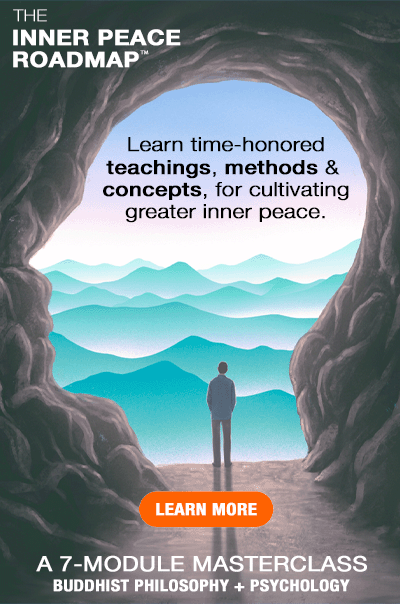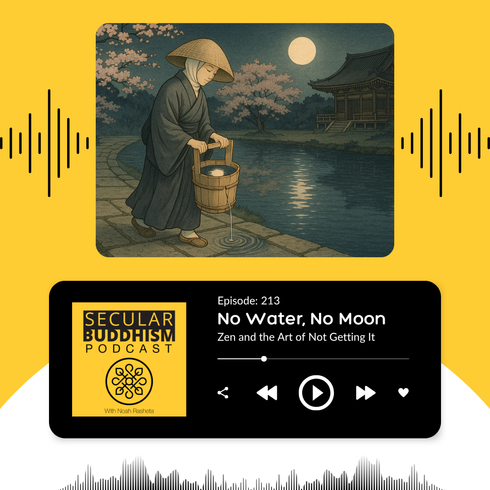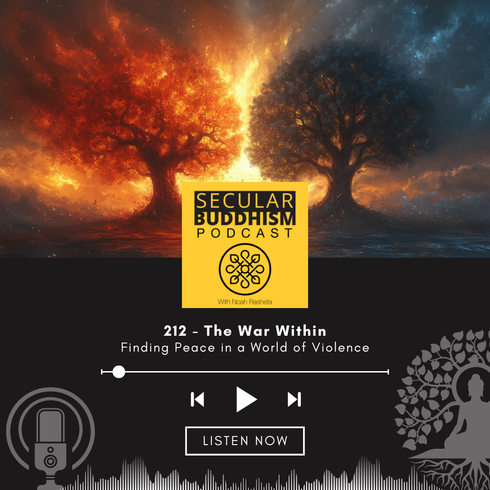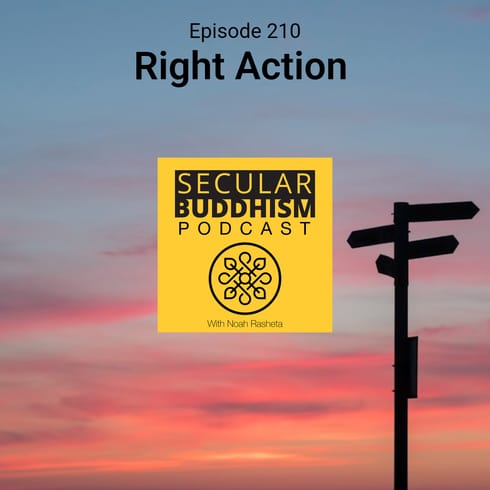In the practice of self-kindness, we often overlook a profound truth: our relationship with ourselves sets the tone for our relationship with others. True kindness is far more profound than its traditional definition. It is a conscious commitment to deep understanding, requiring introspection and a relentless quest to understand our beliefs, thoughts, feelings, and actions. We must strive to see the world from another’s perspective and acknowledge that what may seem like an act of kindness to one may not have the same meaning for another.
Transcript
Hello and welcome to the Secular Buddhism Podcast, a podcast that presents Buddhist teachings, concepts and ideas from a secular perspective. You don’t need to use what you learn from Buddhism to be a Buddhist. You can use what you learn to simply be a better, whatever you already are. I am your host, noah Rashida, and let’s jump into today’s topic. This is episode number 181. Today I wanted to talk about the topic of kindness, specifically self-kindness or self-compassion. Some quick background here. You may recall I’ve mentioned this in previous podcast episodes, but for the last several months I’ve been developing an online course called the Inner Peace Roadmap. Part of this course entails presenting several new frameworks to help understand what it is that’s happening in our minds and which techniques are beneficial for learning to develop greater inner peace or cultivating inner peace.
One of the lessons in the Inner Peace Roadmap is called the no Self Method. That’s K-N-O-W, in other words, to know yourself. Self-knowledge, I believe, is a critical component in cultivating inner peace. By gaining a better understanding of ourselves, we can develop a more skillful relationship with all of the different parts that make up who we are and how we function. The no Self Method is a unique blend of concepts and ideas from Eastern philosophy, from Buddhism, specifically from modern psychology, and just practical wisdom designed to help you, to guide you toward a better and deeper understanding of yourself and the way you experience being alive. It invites you to explore no Self is an acronym, so it invites you to explore.
Kindness, non-self, observation, wisdom, stress, emotions, liberation and fluid flexibility. Those are eight powerful concepts that together form the pillars of this no Self Method. Whether you’re seeking to just navigate life’s challenges with a little bit greater ease, or to cultivate a deeper sense of inner peace, or if you just want to understand yourself better, this method the no Self Method offers a comprehensive approach to introspection, mindfulness and resilience. Looking at these letters again no Self as an acronym there’s essentially a key question at the heart of each of these eight concepts. For K, we have kindness. In other words, how do I express kindness towards myself? For the N, we have non-self. The key question here is how closely does my self-perception align with reality? For observation O what patterns can I identify in my behavior? For the W wisdom how have my experiences shaped my self-perception? S for stress what triggers my stress response? E for emotions how do I navigate my emotional landscape? L for liberation in which areas of my life do I feel confined? And F for fluid flexibility. How well do I adapt to life’s changes?
So this is an introspective method of getting to know yourself, and today I wanted to talk about the first of these eight topics kindness. I do plan on presenting the other seven topics, probably the next seven podcast episodes. So if you’re listening to this one and you want to hear the rest of this method, follow along for the next seven episodes. Okay, so let’s just start with this first one, and I want to share something that I wrote. So I’ll interject here real quick that on my personal website, noahrochettacom, I’m starting to collect writings, just things that come to mind as I try to present concepts and ideas. A lot of these are concepts that come to mind as I’m preparing this course. I’m writing them and if you want to follow along and subscribe to my newsletter for occasional mindful musings, feel free to do that at NoahRochettacom and there you’ll find my thoughts on what I’m sharing today with this notion of redefining kindness.
So to comprehend the essence of kindness, we must venture beyond its traditional definition. It’s, while commonly defined as being friendly, generous and considerate, the concept of true kindness, I believe, is far more profound in the pursuit of inner peace. True kindness is a conscious commitment to deep understanding. It’s a deliberate exploration and engagement with the complex nature of our own selves as well as others. It implies introspection, a relentless quest to understand our beliefs, thoughts, feelings and actions. So the essence of true kindness, I believe, lies in our ability and willingness to understand and connect with the core of our humanity, both within ourselves and in others. I think it’s about striving to see the world from another’s perspective and acknowledging that what may seem like an act of kindness to one may not hold the same meaning for another.
Now, this idea is expressed perfectly in a quote by the philosopher Alan Watts, where he says kindly, let me help you or you will drown, said the monkey, putting the fish safely up a tree. Close quote the monkey, despite its well-intentioned efforts, is blinded by its own perspective. Its kindness, while sincere, is inadvertently harmful, I believe. Similarly, our attempts at kindness may unintentionally lead to undesired consequences if they spring from a place of misunderstanding or lack of self-awareness. So this is what I mean by the notion of redefining kindness, especially in the context of an introspective practice. To be nice is one thing, and it’s pleasant to be around someone. That’s nice, and it’s great to be nice to yourself, but I don’t think that’s at the heart of this introspective practice of kindness.
Just like with the monkey unintentionally causing harm to the fish by trying to be nice to it and put it in the tree, I think the same thing happens to ourselves, from ourselves when we’re trying to practice self-kindness. I think we can mistake self-care for short-term comforts or aim to suppress our painful emotions, thinking it to be kind. In other words, I’m not going to say what’s really on my mind to you, because maybe it’ll be more kind for me to leave that to myself In the process. Now I’m stewing on these feelings and emotions. That’s just one example. Obviously, you can go to the other extreme, where some people share everything, and maybe the kind thing would be to not share. Think of the middle way as you approach this.
But I think perhaps the kindest act that we can offer ourselves is to confront the uncomfortable truths and to understand our vulnerabilities and to accept them as part of our growth. In other words, I could be kind to myself and not work on the aspects of me that need to be worked on, because I think, well, I want to be nice to myself so I’m just going to pretend this isn’t an issue I need to fix. That would be an example of this misunderstanding and where kindness is not beneficial. Instead, I could say no, this is something that I need to sort out. These strong emotions I’m feeling I need to see where they’re coming from. I need to put in the hard work. It’s not going to be easy. It may seem like the kind thing to do is just put this aside and pretend it’s not a big deal, but that’s not what kindness is. The kind thing would be to say this is going to be hard work and I’m going to go put in the time and the effort to do the work to make things better, because that ultimately benefits me and my well-being, but also everyone around me Embracing true kindness.
It’s not a process that can be completed overnight. I don’t think it’s something like okay, I’m going to flip the switch and now here’s the new me. I think it’s an ongoing journey and it’s an endless cycle of learning and perhaps even more importantly, unlearning. We’re all shaped by our unique life experiences, our emotions, our thoughts, our beliefs, the actions that we take, the consequences that arise from those actions. These elements end up, shaping and forming the narrative of our lives. True kindness is about recognizing and honoring these narratives and all of their complexity and depth. It’s about extending patience and acceptance, taking the time to understand without judgment and applying this understanding to others. Each person’s narrative, including our own, deserves this level of kindness. Each deserves to be seen, heard and acknowledged.
Thinking back real quick to this analogy of the monkey and the fish the monkey, in trying to be kind but interjecting its own perspective of reality onto the fish, who has a whole different perspective of reality, that is a misguided kindness that has unintended harmful consequences. That’s a very obvious mental image. Monkey, taking a fish out of the water and putting it in the tree is not only harmful, that’s going to kill the fish. This perspective is saying what the monkey. True kindness on behalf of the monkey would be to understand the nature of the fish, to understand that fish is nothing like me. What it needs is nothing like what I need, and I’m going to honor that. I will do what I can to keep the fish in the water, to help it thrive in its environment, because its environment is not the same as my environment. I think as humans we make this mistake, a lot of thinking that you need to be like me. The environment that works for me, the beliefs that work for me, the methods that work for me you need to have those too, and we end up doing what the monkey did we’re trying to pluck people from their environment and to put them in our tree because the tree works for us. That’s not beneficial.
I think this new interpretation redefining kindness. It bridges that divide between mere good intentions and authentic empathy. That’s what we’re after. It’s the key to have more genuine relationships, both with ourselves and others. That contributes to the cultivation of a lasting inner peace, which is really what we’re all after at the end of the day. Now there’s something worth mentioning here that in the practice of self-kindness, we often overlook a profound truth Our relationship with ourselves sets the tone for our relationship with others, and I think this is a really important thing to understand.
If we can’t understand and be kind to ourselves, our kindness to others is likely to fall short, very much like the kindness of the monkey falls short to that fish. And while this realization may be unsettling, I think it’s also empowering, because it provides us with the knowledge and the capacity to affect change. How do we do that. Well, I think the key here is to say if I don’t understand you very, very well, then I should definitely not be assuming what I think is best for you. If that’s true, that’s also true about myself. If I don’t truly understand myself, what is the source of my thoughts and feelings and emotions, my beliefs, understanding how my actions contribute to my life and the life of everyone around me? What are the consequences of my actions? How are those consequences creating experiences for me and for others? If I don’t have a thorough understanding of this for myself, I may be like that monkey that’s doing things that I think are kind for me that are actually not beneficial. So I think that’s an important thing to keep in mind.
I think the truest form of kindness isn’t just about being friendly, generous or considerate. It’s about a conscious effort to understand, respect and accept the complexities of our own inner world and the inner world of others. I think it’s about striving to understand ourselves and to understand others in a deep, whole way. So with this topic, I hope that we’ll remember that every effort that we make to understand is an act of profound kindness. It has ripple effects that resonate within us, nurturing a sustainable and resilient inner peace. So we should try to be kind, we should strive to be kind, but not only in our actions but in our understanding, for it’s in this deeper comprehension that I believe the true spirit of kindness resides. So that’s the topic I wanted to share today, and again in the context of self-practice how can I be kind to myself? I wanted to offer a few suggestions here.
So the first practice is giving yourself daily compliments. Now here’s the thing If you’re honest with yourself, you probably give yourself daily criticism. Most of us do. I like to visualize that we have this concoffinia of voices in our head. Sometimes we have the voice of the self-critic or the inner critic, and that’s a loud voice that says it expresses thoughts like you, idiot, why did you do this? Or you’re so dumb. That voice serves a purpose. It’s the voice that you want screaming at you. If you’re standing too close to the edge of a cliff, or if you hear the rustling in the bushes and there’s a chance that it’s a snake or a tiger, that’s the voice in our head that screams at us. But in day-to-day life, it’s also the voice that’s very critical. So we can counter that voice, not by trying to just eliminate it, but recognizing there are other voices. Let’s listen closely. There is the voice of the inner coach, and the inner coach might be more skillful at giving us daily compliments. Well, we can. We can strengthen and increase that as a practice giving ourselves daily compliments.
So the idea here is to give yourself a genuine compliment at least once a day and make this centered around character or actions. Don’t make this about appearance. So an example here would be you put in the hard work and you accomplish one of your goals. You could tell yourself good job from for completing the goal. But, even more importantly, you could say good job for putting in the effort to complete this task you wanted to achieve. That way, you’re complimenting the hard work. It’s not necessarily the outcome, but you’re complimenting the work that it took for that outcome to be produced. It would be easy to do this for someone else, if you imagine. I like to imagine myself like there’s two of me and it’s me complimenting the other me, because that’s rather than me complimenting me. I don’t like to think of myself as just one single person or entity, so it’s almost like this voice is complimenting this other aspect of me, Like, hey, good job for putting in the effort, the part of you that worked hard, that needs to be rewarded. You can play around with this overall idea, but the idea is to give yourself daily compliment.
Another one is to practice mindfulness. This brings a non-judgmental awareness to the present moment, including your thoughts, emotions and physical sensations. This helps to cultivate greater self-compassion, to develop a kinder relationship with yourself, because what you notice, when you start to pay attention in a non-judgmental way to what’s happening inside, you start to notice. There are a lot of processes like these inner voices I was mentioning before. There’s a part of me that has the voice of the inner critic. There’s the part of me that has the voice of the inner narrator. There’s the part of me that has the voice that’s almost like the angel and the devil on the shoulder, like that analogy the one saying good job, the other one saying no, you didn’t do good enough. Both of those are aspects of my thoughts and I like to practice mindfulness where I just pay attention. What am I hearing, what am I feeling, what am I thinking, what am I sensing, but in a non-judgmental way. I’m not trying to shush the one voice, I’m just trying to pay attention. What’s actually happening here. In the process of doing that, I start to feel a greater sense of compassion for each of those aspects of myself, so, in this case, the voice of the inner critic, or, if you want to picture this like the devil on your shoulder. You can have compassion for that voice, like, wow, okay, I see you’re all riled up. Why does this mean so much to you? Where’s that coming from? I feel compassion for you for being so wound up with this. It’s an interesting practice, but give it a try. Then challenge yourself. Criticism when you do have these thoughts that arise in a harsh tone like that. Just remember, just because you think it doesn’t mean it’s true, you can challenge your own thoughts and beliefs, I like to add, but really at the end of every thought. So if I notice that inner voice saying something like ah, you’re such an idiot, then I challenge it and say, yeah, but am I so? I’ll just give you a quick example Last night.
I’ve been writing for months and last night I had six chapters of my writing and I made the mistake of. I thought I could edit the heading of that section of my book and in doing so I didn’t realize it deleted all of the chapters. Now this was done on a new software that I’ve been using that I didn’t have it backed up and saved somewhere else like in a Word document. It’s a very silly mistake on my part, but I lost the six chapters and because it’s all hosted online on this website I’m using, I called them and I said is there any way you can recover these chapters that I accidentally deleted? When I deleted the heading of the chapter and they said, no, the software doesn’t allow that. And, oh man, it was so disheartening to lose all that writing and literally not have it anywhere. I had finished, I had probably spent 10 hours writing that and then when I went to save that or not to save it, to edit it, I deleted it.
And of course, that inner voice is like you idiot. And right away I thought, yeah, but am I an idiot? I mean, it was a honest mistake on my part. It’s almost like this is happening in my head right, one side, saying I can’t believe you didn’t back it up, and I was like, well, yeah, but 95% of the time I do back things up, and this time, because I had just finished all of this writing today, I didn’t. And this dialogue’s happening in my head and I felt compassion for the part of me that was mad, at the part of me that made the mistake, and it was, you know. It’s like, well, all right, well, this is what is now. So let’s pivot and let’s get right back to writing. And it was still disheartening. It was still all of the feelings, all of the emotions. But I challenged the self-criticism, I challenged that inner voice and said, all right, well, I’ll just, I’ll do it again. There’s nothing I can do now and I won’t make that mistake again. I can guarantee you that. So that’s one way to challenge the voice of that self-critic.
And then a final practice here a gratitude journal. I feel like when we spend the time to think about what it is that we’re grateful for, gratitude produces a sense of contentment and joy that arises naturally, simply because we’re thinking about the things that we’re grateful for Now in the context of kindness. I believe it’s easier to be kind and to seek understanding when we’re feeling that sense of gratitude, and this is directed at the self right, self-kindness. So gratitude I can think about. I’m grateful that I have the ability to, to be resilient when a mistake happens and I can rewrite it. I’m grateful that I can do that. I’m grateful that I can bounce back and I can rewrite this, probably the very next day, rather than stew on it for a week being mad at myself or, even worse, saying, since I made that mistake, then I’m done, I’m not gonna write that anymore. I’m grateful that I don’t have those tendencies to do it that way. I am going to just rewrite it all and I am going to spend the time to redo it. I’m grateful for that. That sense of gratitude that I feel gives rise to a greater sense of kindness to myself. I don’t know if that makes sense, but I’m just trying to put this in the context of my own life and my examples.
So that’s the topic that I had in mind for today’s podcast episode practicing self-kindness, redefining what kindness means to you, not just being nice to yourself, but thoroughly spending the time to understand yourself, to really get to know you, to try to analyze. Is there a part of you that’s the monkey that’s treating another part of you that’s the fish and doing unskillful things with all the best intentions? That’s the self-portion of it. But then you can also take this and analyze your relationship with others. Do you do this to other people.
Are you the monkey that’s taking the fish and trying to put it in the tree, with all the best intentions? Or consider the flip side of that. Are you the fish and are there people in your life that are trying to pluck you and put you in the tree and you can be deeply offended by that? Or you can look at it like if they’re the monkey they don’t realize, they don’t know, and then the goal is help them understand you better and maybe, just maybe, they won’t try to pluck you and put you in the tree.
Now we can’t control others, but I think that’s a helpful visual for me that makes me feel kindness, instead of when the monkey’s trying to put me in the tree, instead of me being deeply offended at this monkey because they’re intentionally trying to cause harm. I recognize it’s not intentional. It comes from a lack of understanding, very much like the monkey and the fish. So, anyway, those are different ways to think about this overall topic of redefining kindness. Thank you for listening to the Secular Buddhism podcast. If you enjoyed today’s topic and you want to learn more, visit secularbudismcom, where I have links to my books, courses, podcast episodes and information for how to join the Secular Buddhism podcast community. Thank you for listening. Until next time.
Transcribed by https://podium.page
Explore topics
Explore pages
Subscribe
Related posts
A DOSE OF WISDOM IN YOUR INBOX
Subscribe to the newsletter to receive time-honored teachings in your inbox. This content is aimed at helping you cultivate a greater sense of inner peace. You’ll also be the first to receive updates on podcasts, events, retreats, and workshops, and gain exclusive access to content available only to subscribers.



